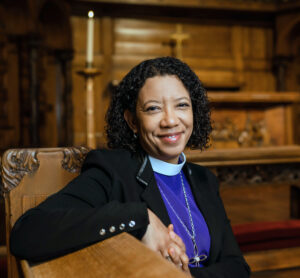Earlier this year, during an extended meeting, I asked my staff to take some time and consider the question, “What does it take to make church?” I asked them to mentally strip away all the “things” of church, the accoutrements that we have become used to, and articulate what at root makes us the Body of Christ. The staff came up with the following “ingredients:”
> The Gospel, prayer and people
> A view and appreciation of ‘the other’
> Sharing the God we’ve known in and through Jesus
> A willingness to gather and be formed in faith
> Open hearts and a willingness to really listen (to the Spirit, to one another, and to those outside our congregations)
> Owning an identity as people called by God to serve the world
> Knowing the mission of Christ in the world and living it
> A spirit of cooperation and compromise (because church isn’t only about you!)
> A willingness to have hard conversations and to speak truth in love
> The ability to disagree and to continue loving each other
> The willingness to ask for and to offer forgiveness
> Seeking to live intentionally what we profess and pray
> Respecting the dignity of every human being
> Forming disciples and continuing that formation for life
> Authenticity and hospitality
> The ability to organize and encourage others
> A willingness to give of ourselves and our financial resources in service to others
> The Grace of the Holy Spirit
I do not pretend that this list is exhaustive, but I have returned to it time and time again this year as I’ve written my sermons and prepared for visitations. As we are emerging from a not-quite-post-COVID world, we are facing a grieving and divided world; how we are church matters.
As we live into this new church landscape, I am often asked what my vision is for the Episcopal Church in Colorado. When I get that question what I hear is a desire for a sure-fire marketing strategy, or a quick fix for whatever ails us. But our life of faith is not about MY vision; it is about the vision God is unfolding in our midst. For the church, vision cannot be about an individual’s great idea; the church’s vision must be centered on faithful living and our willingness to lean into our call to heal and reconcile our broken world.
Likewise, our vision cannot be rooted in self-absorption. If all we are interested in is maintaining our institution, expanding our edifices, and filling our coffers, then we are doomed to fail. Our vision must be about more than self-aggrandizement. Our vision must be about living our faith through loving God and loving our neighbor. And our notion of neighbor cannot be confined to those who look like, think like, vote like, act like us. The church is not called to lock itself in its gated community in a spirit of self-satisfaction. Like the Good Samaritan, the church must be willing to walk strange roads: to encounter the suffering, the battered, and the broken and to respond with mercy, help and healing.
I know that God’s vision is unfolding for us; the Holy Spirit is at work in congregations small and large all over this Diocese. The vision that is emerging is a vision rooted in love. It is a vision characterized by justice, and humility. It is a vision formed in truth — that is the very being of the triune God who creates, redeems, and sustains us. Our vision will not be about promoting the “kingdom of church;” it will be about reflecting Jesus and the kingdom of God. For us to apprehend this vision we must be willing to do the hard work of discernment: opening our hearts and minds to the Spirit, listening to those on the margins, confessing and repenting, and trusting in the transforming power of Grace.
We make church when we are willing to follow Jesus and to be formed, reformed and transformed into the likeness of Christ.
Bishop Kym Lucas, Episcopal Diocese of Colorado

